Samuel Chapman Armstrong of the Hampton Institute writes to Richard Henry Pratt forwarding a letter about girls recruited for Carlisle that are waiting in Yankton until the agent there believes the river has enough water to transport them. Armstrong reports concerns that the recruits will abandon the trip.
Armstrong, Samuel Chapman
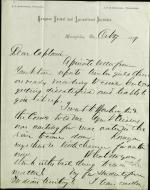
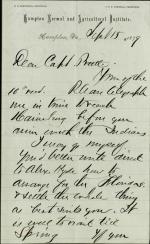
Samuel Chapman Armstrong of the Hampton Institute writes to Richard Henry Pratt discussing arrangements for Indians coming to either Hampton or Carlisle, as well as arrangements to transfer the Florida prisoners north. He also notes that Pratt can turn to the American Missionary Association for funding.
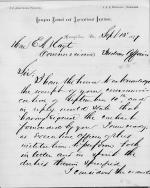
Hampton Institute Principal Samuel C. Armstrong informs Commissioner of Indian Affairs E. A. Hayt that he has signed his contract. He states that he's unhappy with the terms of the contract and describes the expense and difficulty of educating Indian students.
Note: This item was copied from U.S. National Archives microfilm reels (M234…
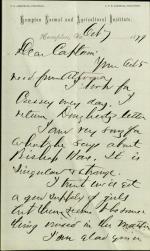
Samuel Chapman Armstrong of the Hampton Institute writes to Richard Henry Pratt, discussing some correspondence from mutual acquaintances. Armstrong also discusses Pratt's recent recruitment efforts, including gender and health concerns.
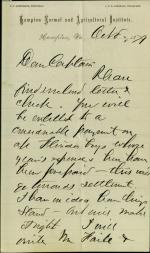
Samuel Chapman Armstrong of the Hampton Institute writes to Richard Henry Pratt about payment for expenses for prisoners from Ft. Marion.
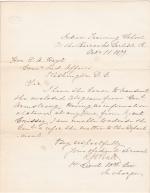
Richard Henry Pratt forwards to Commissioner of Indian Affiars Ezra Hayt a telegram sent by General Samuel Armstrong of the Hampton Institute. Armstrong telegrams Pratt asking whether he (Armstrong) is needed for a recruitment trip to Dakota, and Pratt forwards the telegram to the Commissioner for consultation.
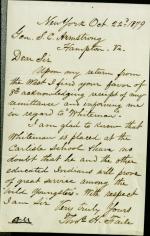
Samuel Chapman Armstrong of the Hampton Institute writes to Richard Henry Pratt discussing a recent conversation with Commissioner of Indian Affairs Ezra Hayt, and forwards a letter (on the reverse side of the page) to Armstrong from Thomas H. Fraile about Whiteman's placement at Carlisle.
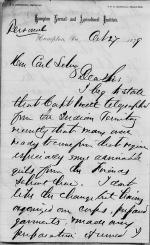
Hampton Institute Principal Samuel C. Armstrong informs Secretary of the Interior Carl Schurz that he received a telegraph from Captain Richard H. Pratt, who is currently in the Indian Territory. Pratt stated that there are many Indian girls in the Indian Territory who would be suitable students at Hampton. Armstrong states that, though he…
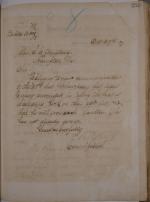
Commissioner of Indian Affairs Ezra A. Hayt writes to Samuel Chapman Armstrong at Hampton to report that Indian Agent Charles Crissey left Standing Rock and will likely reach Yankton soon.
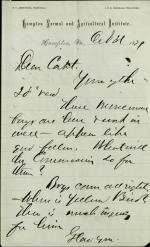
Samuel Chapman Armstrong of the Hampton Institute writes to Richard Henry Pratt discussing recently arrived Menominee boys, and inquires about Yellow Bird.
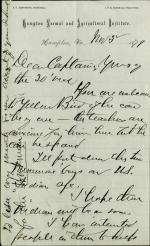
Samuel Chapman Armstrong of the Hampton Institute writes to Richard Henry Pratt about transferring some students, including Menominee boys and Yellow Bird, to Carlisle. Armstrong also discusses a visit to Carlisle on a trip north.
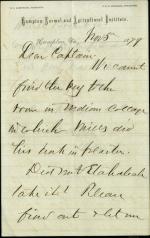
Samuel Chapman Armstrong of the Hampton Institute writes to Richard Henry Pratt inquiring whether Etadleuh still has the key to the Medium Cottage where Clark Mills took plaster casts of the heads of prisoners from Ft. Marion. Armstrong also discusses Hampton's capacity for Indian students.
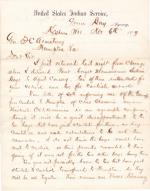
Richard Henry Pratt forwards to the Commissioner of Indian Affairs a letter, sent to General Samuel Armstrong of the Hampton Institute by Green Bay agent E. Stephens. Stephens requests that two students just sent to Carlisle, Joseph Wishecoppy [Wisecoby] and Moses Nonway, be sent to Hampton to join two other recently enrolled Menominee students…
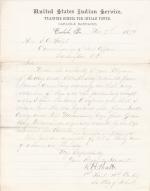
Richard Henry Pratt informs Commissioner of Indian Affairs Ezra Hayt that, at the request of Hampton Institute director General Samuel Armstrong, six Sisseton Sioux children and two Menominee boys from Green Bay, Wisconsin will be retained at Carlisle. Their addition increases the school's population to 158.
Note: The two Menominee…
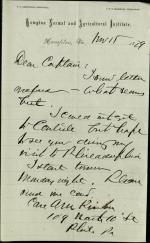
Samuel Chapman Armstrong of the Hampton Institute writes to Richard Henry Pratt to make arrangements for Armstrong to visit Carlisle while in Philadelphia.
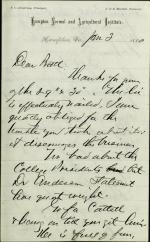
Samuel Chapman Armstrong of the Hampton Institute writes to Richard Henry Pratt about their efforts to build public support for their work via college presidents, notable figures, and newspaper articles.
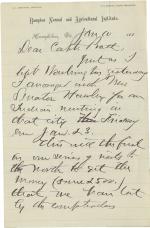
Samuel Chapman Armstrong of the Hampton Institute writes to Richard Henry Pratt informing him of a potential meeting between Armstrong and Senator Hawley to discuss money owed to Hampton by the government.
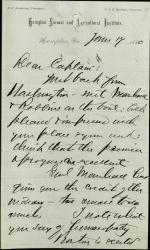
Samuel Chapman Armstrong of the Hampton Institute writes to Richard Henry Pratt discussing various individuals' views towards Indian education, as well as per capita rates.
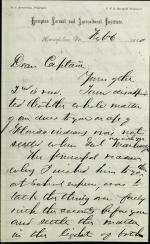
Samuel Chapman Armstrong of the Hampton Institute writes to Richard Henry Pratt about ongoing disagreements with Washington officials over expenses to be paid for the prisoners from Ft. Marion.
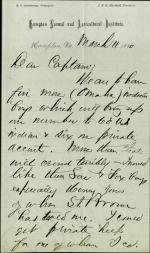
Samuel Chapman Armstrong of the Hampton Institute writes to Richard Henry Pratt discussing capacity issues at that school, including the arrival of five Omaha boys which increased enrollment at Hampton to its maximum. Armstrong also mentions Sac & Fox students and the enrollment of Indian students via both government and private support.
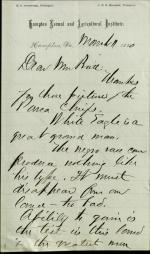
Samuel Chapman Armstrong of the Hampton Institute writes to Richard Henry Pratt thanking him for photographs of visiting Ponca chiefs at Carlisle, discussing aspects of their visit and Armstrong's fundraising attempts for a new building.
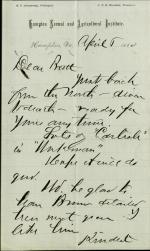
Samuel Chapman Armstrong of the Hampton Institute writes to Richard Henry Pratt letting him know that Hampton's newspaper, the Workman, contains several articles about Carlisle.
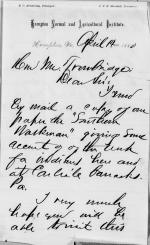
Wrapper for Samuel C. Armstrong's letter forwarding a copy of the newspaper, The Southern Workman, which details some of the work for Indians done at Hampton Institute and the Carlisle Indian School to the Commissioner of Indian Affairs Trowbridge.
Note: This item was copied from U.S. National Archives microfilm reels (M234), which were…
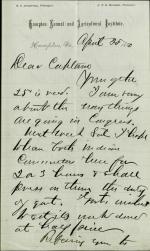
Samuel Chapman Armstrong of the Hampton Institute writes to Richard Henry Pratt sympathizing with Pratt's ongoing issues to gain political support for adequate funding for Indian education. Armstrong also criticizes the need for philanthropic funding, saying "referring you to private charity is shameful and disgusting."
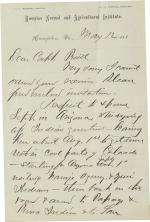
Samuel Chapman Armstrong of the Hampton Institute writes to Richard Henry Pratt discussing an upcoming trip to Arizona by way of Colorado and the Navajo agency, and requests advice for the trip.
